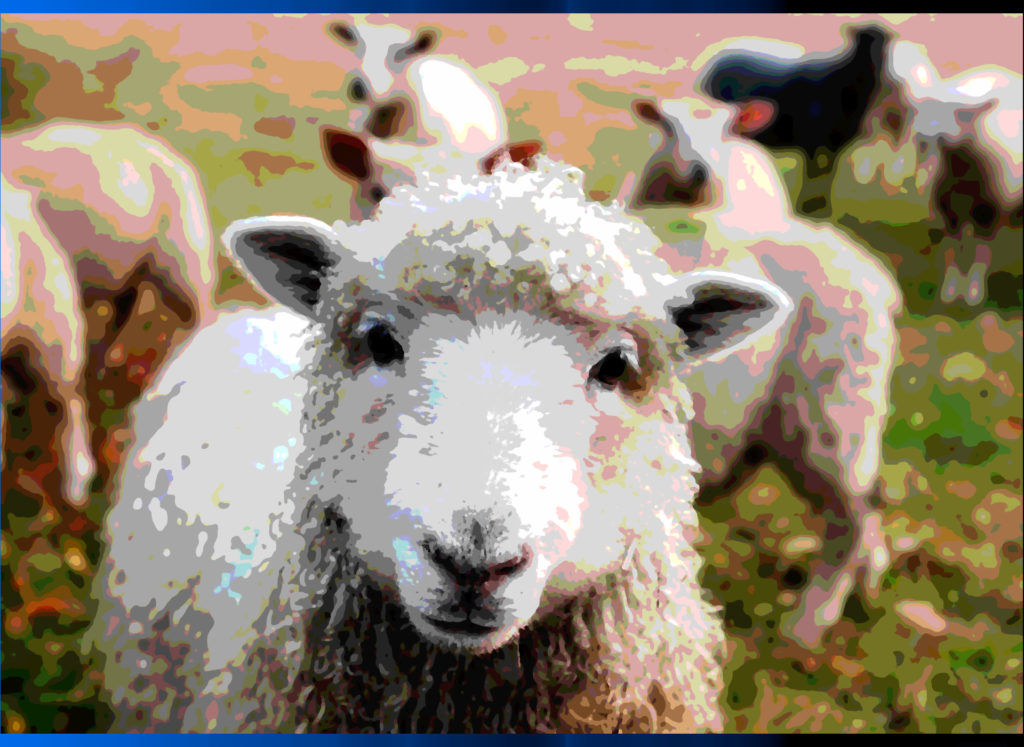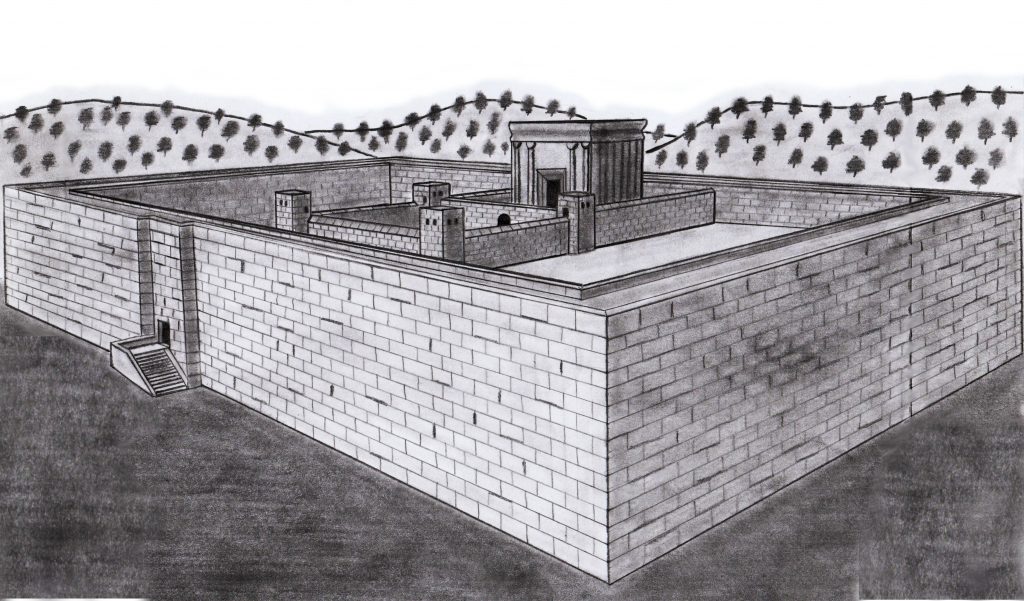
(4-5 Minute Read)
Genesis 28:10 – 32:3
The Torah parasha, or portion, of Vayetze begins its narrative as Jacob departed from Beer Sheva for Haran. On the way after the sun had set, he used a stone for a pillow and went to sleep. He dreamed of a “ladder” reaching from earth to the sky, and the malakhim, angels, of the Most High going up and down upon it. The Almighty informed Jacob that the ground upon which he was lying would be assigned to his offspring, who would be as the dust of the earth and spread out in all directions. The Eternal One further reiterated that all families of the earth would bless themselves by him and his descendants. The Almighty would be with Jacob and protect him, and ultimately bring him back to this land.
Jacob awoke from his sleep and declared the place to be the “abode” of the Almighty and the gateway of heaven. Early the next morning, he set up the rock as a pillar and poured oil over it, calling the place Bethel. Jacob then vowed that if the Most High would protect him and provide for him, then he would serve the Eternal One. The stone would be the abode of the Holy One, Blessed be He; and he would set aside a tithe for Him.
Jacob arrived in the land of the easterners. He came to a well with three flocks of sheep nearby, waiting to be watered. Jacob determined that the herdsmen were from Haran. They informed him that Laban was well, and his daughter, Rachel, approached with their own flocks. Jacob was told that the stone covering the well was only rolled off of the mouth of the well when all the flocks had been rounded up.
When Jacob saw Rachel, he rolled the stone off of the mouth of the well and watered the flock of Laban. Jacob kissed Rachel and wept, telling her that he was Rebekah’s son, a relative of her father. Rachel told her father, Laban, who greeted Jacob and invited him into his home.
Jacob and Laban negotiated wages. Jacob agreed to work for Laban for seven years in order to marry Rachel.

After seven years, which seemed to Jacob as merely a few days because of his love for Rachel, Jacob requested from Laban to marry her. Laban hosted a great wedding feast. But Laban gave Jacob his daughter Leah instead. (Laban had also given Zilpah to Leah as her maid.) The next morning, Jacob discovered Leah and angrily demanded why Laban deceived him. Laban claimed that it was not proper according to local custom for the younger daughter to marry the older. After the bridal week was over, Laban would also give Rachel to Jacob as a wife — providing he worked for him for another seven years. Jacob did so, and married Rachel as well. (Laban gave Bilhah to Rachel as her maid).
Seeing that Leah was unloved, the Almighty made Leah fertile; but Rachel was barren. Leah gave birth to four sons named Reuben, Simeon, Levi, and Judah.
When Rachel saw that she had not borne Jacob any children, she became envious of her sister, Leah. Rachel said to Jacob, “Give me children, or else I will die!” Jacob became angry, saying he could hardly take the place of the Almighty Who had made her infertile. Rachel gave Jacob her maid, Bilhah, in order to produce children. Bilhah bore Dan and Naphtali.
Seeing that she had stopped bearing children, Leah gave Zilpah to Jacob. Zilpah gave birth to Gad and Asher.
Later, Reuben found mandrakes in the field and gave them to his mother, Leah. Rachel begged Leah for the mandrakes. But Leah said, “Was it not enough for you to take my husband?” Leah bore two more sons, Issachar and Zebulun. And she also gave birth to a daughter named Dinah.
The Most High remembered Rachel; she gave birth to a son named Joseph.
Jacob requested permission from Laban to return to his homeland. Laban claimed that he had learned through divination that he had been blessed on account of Jacob. Jacob and Laban again negotiated wages. Jacob requested the livestock that were spotted and streaked in color for himself, while the solid and dark colored animals would be Laban’s. His father-in-law agreed, but then immediately removed the spotted and streaked animals and gave them to his sons to care for instead.
Jacob separated the flocks by various categories, and set up rods with white shoots near the watering troughs where the flocks mated. Jacob ensured that as many spotted and speckled livestock would be born as possible, and that they would also be the healthier and stronger animals. So Jacob became prosperous, possessing many flocks and other livestock as well as servants.
Jacob saw that Laban and his sons were growing hostile towards him. The Almighty told Jacob to return to the land of his fathers, and that He would be with him.
Jacob called Rachel and Leah to him, noting that despite his father-in-law’s poor treatment, with the help of the Most High he had become prosperous. He also related that the Eternal One had instructed him to return to his native land. Rachel and Leah concurred with their husband on both matters.
Jacob gathered his family, livestock, and other possessions together. They departed in secret to go to his father, Isaac, living in the land of Canaan. Rachel stole her father’s idols as they left.
Three days later, Laban discovered that Jacob had fled. He and his kinsmen pursued his son-in-law, but the Most High told Laban in a dream not to do anything to Jacob, good or bad.
Laban complained that Jacob and his family had fled hastily without a proper goodbye. Laban additionally criticized Jacob for stealing his idols. Ignorant of Rachel’s theft, Jacob ardently denied taking the idols, declaring that anyone who was found with them should die.
Rachel hid the idols by sitting on them. As Laban searched her tent, she claimed to be on her period. And thus Laban could not find his idols.

Jacob derided Laban for his poor treatment of him over the past twenty years. Laban suggested that they make a pact. Jacob set a stone as a pillar and his relatives set up a mound of stones to serve as a witness between them; Jacob would not mistreat Laban’s daughters, and Laban would not approach Jacob with hostile intent. Jacob offered a sacrifice and invited his relatives to take part in the meal.
Early the next morning, Laban kissed his children and grandchildren and bid them farewell. Jacob continued on his way and encountered the malakhim, angels, of the Most High; he named the place Mahanaim.
One of the most famous scenes in the entire Torah is Jacob’s dream in which he saw a sulam, or “ladder,” extending from earth to the sky above. The chachamim, or rabbinical sages of blessed memory, have identified this site as both the location of the binding and near-sacrifice of Isaac as well as the site of the future Beit HaMikdash, or Holy Temple in Jerusalem. In other words, our rabbis teach that the Almighty ensured that Jacob would spend the night in this holy and sacred place.
The famed Sephardi commentator Rabbi Don Yitzhak Abravanel discussed at length why the Holy One, Blessed be He, chose to communicate with Jacob at this point. After examining eight different viewpoints by various rabbis, Abravanel indicates what he felt was the most “clear and logical” perspective. Jacob had just fled home with little to nothing as his brother, Esau, was trying to kill him. He was poor, alone, and in a strange place. Abravanel also postulated that Jacob worried that using such unethical means as deception and theft would have resulted in Divine punishment. In that context, the Almighty communicated with Jacob to assure him that he would, in fact, be the continuation of the line of Abraham and Isaac; Jacob’s descendants would be “as the dust of the earth,” echoing the same promises made to his father and grandfather.
When Jacob awoke, he determined that this was indeed a holy place. He then made a vow that if the Most High would protect him and give him basic sustenance, and if he returned safe to his father’s house, then the Almighty would be his G-d.
An obvious question is how such a statement is appropriate? After all, it seems to represent a lack of faith in the Most High, and even conditional loyalty. Abravanel and the RambaN both share their thoughts on the matter. One idea, based partly on the teachings of the Rambam, is that Jacob was not completely certain that this was a Divine message rather than merely a dream. The Rambam teaches that revelation in dreams is the “lowest” form of prophecy. Direct, face-to-face contact, which only occurred between the Almighty and Moses, is the highest. Similarly, we read in Shmuel Aleph (1 Samuel) 3 that Samuel the prophet was confused at first by the Eternal One’s communication with him when he was asleep. It was the first time he had received a prophecy from the Most High (3:7), and prophecy was “very rare” in those days (3:1).
In other words, Jacob’s statement wasn’t a question of the trustworthiness of the Most High; rather, he questioned the validity of his experience as Divine revelation rather than just a highly unusual dream. Jacob determined that if the Eternal One fulfilled the promise relayed in the dream, then clearly it was a Divine communication.

Presumably these questions plagued Jacob as he continued on his way towards Haran. He then met Rachel for the first time at the well. Realizing that she was the daughter of Laban, Rebekah’s brother, he kissed her and wept.
There are a variety of various ideas and opinions as to why Jacob wept when he encountered Rachel. One suggestion is that when Jacob met Rachel, he realized that the Almighty had in fact blessed him as the progenitor of the Jewish people and the ongoing conduit of the blessings promised to the descendants of Abraham and Isaac. As discussed in Toledot, the only way that the blessings to all future descendants could be possible was with a partnership with a righteous woman. Jacob was aware that Esau, who had married Hittite and Ishmaelite women, was ostensibly not capable of producing the continued offspring of the Eternal One’s promises. As he came face to face with his bashert, his soulmate, just as his parents had instructed him, he now knew beyond any doubt that the Almighty would bless him and his children, just as he had been promised in his previous dream. This realization that he would be blessed despite his theft and deception as well as the challenges he faced overwhelmed him with intense emotion. Much of his anxiety and fear was released in a single moment as he embraced his future wife and a key matriarch of the Jewish people. Thus, by this theory, Jacob kissed Rachel and wept with tears of overwhelmed, grateful emotion.
It should be noted, however, that it seems that Jacob, while blessed, still was the recipient of negative consequences for his theft and deception of his brother’s blessing. For twenty years Jacob suffered at the hands of his father-in-law, who frequently made him miserable through his own theft and deception. It is plausible to suggest that if Jacob had not approached his father-in-law in the vulnerable state created by his fleeing from his brother, Laban might not have had the same level of leverage over him. For instance, if Jacob had come to Laban with wealth like Eliezer had, then presumably Jacob would not have had to work seven years for Rachel. And in that context, Leah could not have been switched for his intended bride. Similarly, Jacob would not have been a desperate vagabond who could not return home; the theft and deception of Jacob placed him in a vulnerable position to be mistreated by Laban.
One question that is sometimes asked is why Rachel would steal her father’s idols. What purpose would a key matriarch of the Jewish people who no doubt worshiped the Most High along with her husband, Jacob, have with her father’s idols of false gods?
The Midrash, or Jewish tradition, clarifies this aspect. In short, Rachel feared that her father, Laban, would find them as they fled by use of his idols for divination. In other words, she wanted to make sure that Laban did not gain some kind of occult-type insight into their location.
This idea can be further clarified by the Torah text itself. In Bereishit (Genesis) 30:27, Laban said to Jacob, “I have determined by divination that the L-RD has blessed me on your account.” Now, to be clear, the Torah merely records Laban’s claim; the Torah does not say that Laban actually succeeded in gaining any type of occult, spiritual knowledge through his divining idols. It is quite possible that Laban, feeling inferior to the obvious spiritual vitality of his son-in-law, merely lied and falsely claimed to have acquired occult knowledge and power. Regardless, it seems as though Rachel at least believed her father’s claim, even if it was false.
In that context, we can understand why Rachel might have panicked and stolen her father’s idols. If she believed his questionable claims to spiritual power, she would want to protect herself and her family from her father’s usage of those occult “assets.” And by “sitting” on the idols when she was on her period, Rachel clearly didn’t have much respect for the false gods. Also, Jacob indicated that anyone who had stolen these idols should be killed. Presumably, Jacob was so confident that his family had utterly rejected idolatry that he was literally willing to bet their lives on it. Jacob, however, clearly didn’t think of the fact that someone in his family, namely Rachel, might have taken the idols in an attempt to “sabotage” the alleged occult prowess of Laban. Thus, the Midrashic explanation of this incident flows smoothly with the text of the Torah.
May the Holy One, Blessed be He, provide us all with the encouragement we need during difficult times, especially by our acknowledgement that He is with us at all times. And may He ever strengthen us and our families to further grow and overcome all challenges and adversity.


